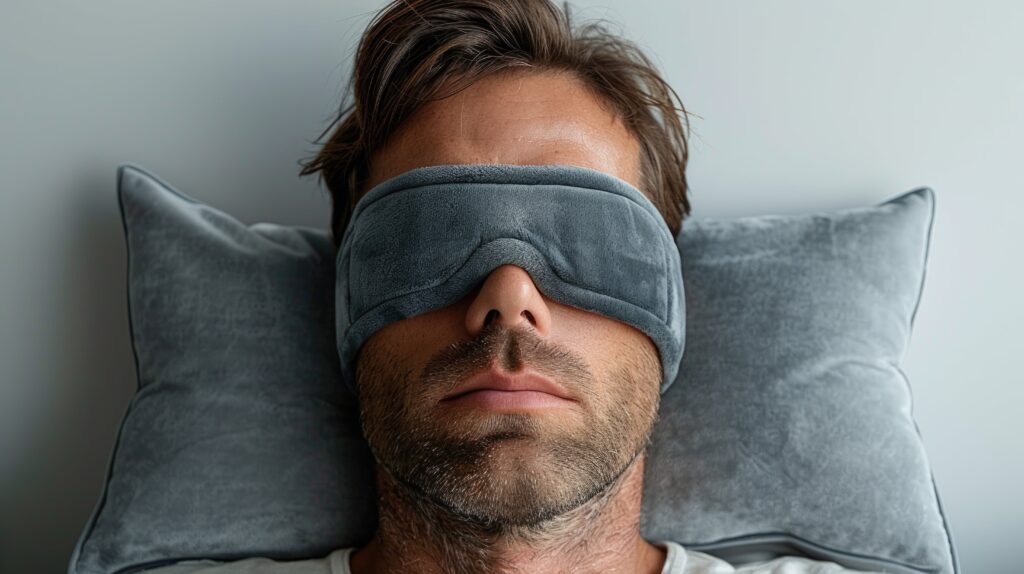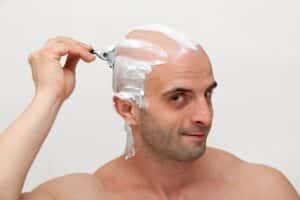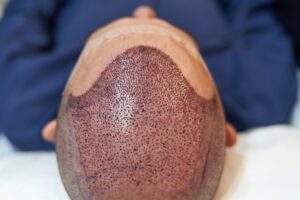A hair transplantation is a surgical procedure. Unsurprisingly, your scalp will be extremely sensitive for a while afterwards. You need to take great care in the post hair transplant period, especially whilst sleeping.
After a hair transplant, the area where they insert the donor hair reddens and scabs. Furthermore, your scalp expels the leftover local anaesthetic during the first night post-transplant.
This is a sensitive period. To prevent the wounds in the healing the skin from sticking to the pillow and tearing open, you must adopt a special sleeping position.
What is the right position for sleeping after a hair transplant?

For the first five nights, a headband will prevent more swelling on the forehead or around the eyes. If you experience swelling, apply ice to your head, but avoid the operated area. Nothing must touch this area.
A pad, changed every night, catches the remnants of the anesthetic leaking from your skin. It also prevents the accumulation of moisture on the skin.
After a hair transplant in Turkey, you need to sleep on your back, facing up. You sleep with your head on a neck pillow to help keep your head slightly elevated in the correct position.
Avoid tossing and turning or sleeping on your stomach. Many people find that sleeping in a recliner is a good way to sleep after a hair transplant, while making sure that their head does not come into contact with any surfaces.
Ensure the newly transplanted hair follicles do not touch your pillows, as the not-yet-anchored hair roots could be torn out. If this happens, not only has the operation been wasted, but permanent scarring may result.
Many clients take a painkiller, if necessary, in order to help them get a decent night’s sleep in this unfamiliar position
After six days, the healing process has partially taken place. You can return to a side sleeping position and no longer necessarily have to lie on your back. To avoid direct contact with the pillow, you should continue to use disposable pads.
You should also continue to use a neck pillow to hold your head in an elevated position. When sleeping after a hair transplant, you should avoid rapid movements or jolts that could damage the hair follicles.
When can you start sleeping in a normal position again after a hair transplant?

After around ten days, the scabs begin to fall off the recipient area and donor area. At this point, you no longer have to use the disposable pads.
You may also resume a sleeping position in the prone position. After two weeks, all scabbing should have disappeared. However, your scalp will still be sensitive to shocks, so you should continue to take extra care.
Tips to improve sleep quality after a hair transplant
Adjusting to a new sleep position after your hair transplant can be challenging, especially if you’re used to side or stomach sleeping.
To support the recovery process, create a calm sleep environment—dim lights before bed, avoid screens, and keep your bedroom cool and quiet. Clean, breathable pillowcases and loose-fitting sleepwear help minimize irritation and sweating, which reduces the risk of infection to the transplanted hair grafts.
Herbal teas like chamomile may help you relax, and a white noise machine can block out disturbances. Avoid caffeine or alcohol in the evening, as both disrupt sleep and slow healing. If discomfort keeps you awake, ask your doctor about a mild pain reliever.
Rest is crucial, especially during the first 14 days when your transplant grafts are still anchoring. Good sleep not only boosts comfort but also plays a vital role in protecting the transplanted hair grafts and ensuring the success of your procedure.
The healing process
Even though modern DHI and FUE hair transplants (Direct Hair Implantation and Follicular Unit Extraction) are minimally invasive, any surgical procedure is a strain on the body.
It is therefore important to recover after your hair transplant surgery with Dr. Levent Acar and to avoid physical exertion.
Reduce or, ideally, avoid sweaty activities and sports after the procedure, as they can negatively influence the healing process.
This is because the sweat that accumulates on the scalp is a good breeding ground for bacteria. This raises the risk of infection of the hair grafts.
After the transplant, you will go back to the clinic for the first hair washing. After three days, carefully wash your hair with lukewarm water.
The scalp should be allowed to dry naturally in the hair, as the heat of a hairdryer causes the hair roots to die. Apply a moisturizing spray several times a day to maintain the elasticity of the wound crusts.
After a week, you can wash your hair with a mild conditioning shampoo. A special lotion that promotes the growth of the hair roots is applied after shampooing and should be left on for 45 minutes.
For the first two weeks after the procedure, you should avoid consuming alcohol, nicotine and highly spiced foods so that blood flow to the scalp is not affected. Approximately three weeks after the hair restoration by Dr. Levent Acar, the hair will begin to grow vigorously again.
FAQ
For the first five nights, you should sleep on your back with your head elevated using a neck pillow. This helps to prevent contact with the newly transplanted hair follicles.
For the first six days after a hair transplant, you must sleep on your back. After that, side sleeping is okay, but avoid direct pillow contact and continue using a neck pillow.
You can start sleeping in a normal position around ten days post-operation when the scabs begin to fall off. However, continue to avoid rapid movements to protect sensitive areas.
To aid healing, avoid sweaty physical activities and sports. These activities increase bacteria risk and can negatively impact hair grafts. Also avoid alcohol, nicotine, and spicy foods for the first two weeks.




